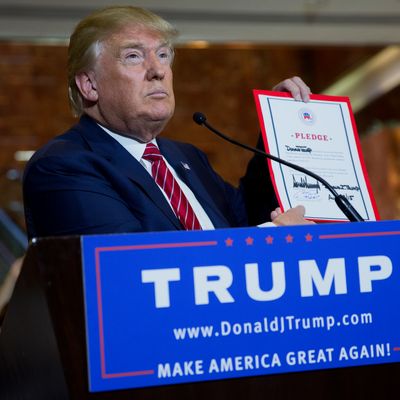
At first glance, it would seem that Republicans scored a major win today when Donald Trump announced that he had signed the party’s pledge to support the eventual nominee, thereby forswearing a third-party run. Ever since last month’s Fox News debate, the specter that Trump could be a spoiler has cast a dark cloud over the party’s 2016 hopes. After all, it was another populist billionaire — Ross Perot — who helped Bill Clinton take the White House in 1992. Now that the third-party option is off the table, the GOP has ensured next fall’s election won’t be a three-way contest that would potentially hand the presidency to another Clinton.
But as Trump has proved time and again this campaign, what on first inspection looks like a setback is, in fact, a surprising victory. By signing the loyalty pledge, Trump is giving up very little while exacting a crucial guarantee from the GOP that the party won’t sabotage his candidacy. The truth is that Trump’s vow to bolt for a third-party amounted to an elaborate ruse. According to Richard Winger, the editor of the newsletter Ballot Access News, Trump faced a looming deadline to get on the ballot in critically important voting states. In December, Trump must file paperwork in Ohio and Texas to enter the Republican primary. If he filed as a Republican then he wouldn’t be allowed to run in those states as independent. Former Trump adviser Roger Stone, who ran Gary Johnson’s third-party run in 2012, told me that a third party run would have been exceedingly hard for Trump if he tried remaining in the party much longer. “It was a bluff so they didn’t keep him off the primary ballot,” Stone said. “A third party was never the way to go if he wants to be president.” But given Trump’s unpredictability, and deep pockets, the GOP bought it. “It was a brilliant business strategy,” Stone says.
Having traded away a long-shot (and expensive) third-party option, Trump has gained much. Number one, as his campaign is quick to point out, the party’s loyalty pledge also applies to the other 16 candidates in the race. “It’s a positive sign that all the other candidates are agreeing to support Mr. Trump when he’s the nominee,” Trump campaign manager Corey Lewandowski told me. Prior to this week, that was an open question. As Trump’s poll numbers surged this summer, there was a push by the GOP establishment to exclude him from debates, potentially keep him off primary ballots, or even discuss funding a third-party challenge.
Trump has also neutralized an obvious line of attack in the second GOP debate that airs on CNN on September 16. This week, Jeb Bush unleashed an attack ad calling out Trump for being a fake Republican. Trump can now point to the pledge as a credible defense. “At the CNN debate they can’t accuse him of being disloyal,” Stone says.
Most important, by making peace with the GOP, Trump has quieted one front and can now focus on other battles. As one Trump friend told me: “He can’t fight a three-front war against the RNC, Murdoch, and the Kochs.”





























